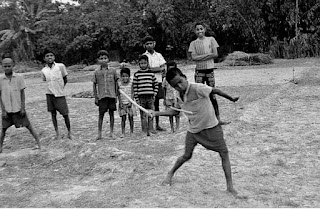It was January 2000, the beginning of another millennium (of course, it’s counting only), my first visit to Osho International Meditation Resort, Pune. Many celebrations were happening all around. Small stickers and photos and other items had been in display for free pick up and distribution, in front of the bookshop. Buddha hall was see -through, music and silence always spreading in the air from there, as part of the meditations. A white swan in a near by pool enjoyed its dervish whirling for the exhilarating rhythms of Sufi music.Wearing a loose robe, I am also, part of a maroon flock. For a few moments, I found myself that I am in an altogether different universe. But very soon, I felt that it’s an ancient space and so familiar to me.
It was next day already that I participated in a meditation called Gibberish.
That word was not foreign to me at all, as I had read it many times in a few of
Osho’s books, and had the impression that I knew Gibberish. But when I started doing
it, I understood the difference between experiencing something directly and
thinking of experiencing it through words or imagination.
Even though Osho says, that making these nonsensical sounds is quite
common in everybody’s childhood, after that one hour meditation, I understood
that, Gibberish is not just a childhood habit, but that it has been effectively adapted into our daily activities
and living situations in many ways. The only difference is that, we are not
conscious of it. Because of our unconsciousness, although a certain relief is
felt, we have missed a wonderful opening into a realm of silence and awareness.
All such situations of ‘practical gibberish’ went through my mind and automatically,
found their place in the ‘jigsaw puzzle’ of understanding. I would like to
share two such lessons here.
Mani’s magic
When I started my job as a site supervisor in electrical engineering
projects, I had a freaky ‘JABBAR’, a technician in our team of workers, who did
magic with Gibberish.(I call him Jabbar now, by the name of the Sufi master
who used this as a technique. It is said
that the word Gibberish comes from his name.)
In those days, I hadn’t heard
this word (or jabbar’s name). Even the boy who was using this trick was not
aware of anything like it. He and his workmates were doing this habitually,
whenever many difficulties arose in material moving, cable laying, panel board installations
etc.
One evening, when I came back to the office after finishing a day’s duty
in a faraway site, I was instructed to rush to another site and carryout the
breakdown jobs which had already been started. It was in a coconut oil factory.
A fire had broken out in one of the cable alleys, and one unit of the
factory had been cut off from production. Those cable alleys were chocked up with
oily coconut waste, and when some short circuit happened, fire had broken out
and burned all electrical cables. Our job was to replace the burned cables and
reconnect them to the main panel boards.
It was already 10 o’ clock at night, everybody felt exhausted. All of
them had been working hard since early morning and nobody was in the mood of
continuing. Some people even said, they were unwell. Somebody else had some
urgency why they had to go home. Somebody was sleepy, another was very hungry and
many such reasons.
After listening to them
carefully, I told them, “we will go home after laying three more cables only.”
They understood that no excuse was going to work. Then two people from the
group came to me and whispered, “Call that boy. Without him nothing is going to
work at this late hour. He will do the magic.” They came up with this advice, seeing that I was a new
supervisor who didn’t have enough experience.
I accepted their suggestion and called that boy to lead the cable
laying. His name was Mani. On the promise that once all the three cables are in
place, we could retire for the day, they were in hurry to finish it as quickly
as possible.
Mani came forward and appointed his work mates to different positions
along the cable. It was a heavy cable, around two hundred and fifteen meters long.
All twenty people stood in line from one end to the other with Mani in middle.
Mani clapped his hands once and everybody became silent immediately. No laziness,
no tiredness, no urgency to go home, no hopelessness about the difficulty of
the task, no different ideas, nothing.
All of them (me included), became utterly receptive for something to
happen. Then Mani started doing Gibberish like, ‘SHASHTATATATUTTA
PASHETUVITITTA TIHURIITARAE LUKUSSITTUAEREERE SUTUTU TSUTUTU VIKICHUCHU TATTATA
TATTATA……..’ and its speed and tone went on increasing. May be after 40 or 50
seconds, he made a loud shout, “LIFT”. It was like a ‘silent explosion’.
Such a heavy and long cable was lifted immediately and was carried by twenty-
one people, in total silence. It had to be taken through a very narrow chamber
and many hurdles were there. But none of them spoke or made any unnecessary
noise. A clear-cut communication was happened among them naturally. After some
time a loud applause arose to celebrate: the cable had reached the other end!
I stood in awe like a small child watching a magic show. All cables were
placed in their position without any hustle and bustle. And we all retired soon
afterwards.
From that day on Mani became my special friend, and as a supervisor I
used to give him many privileges as a gift for his Gibberish. Actually, it was
a gift exchange for something unknown that felt magical to me.
Pachilapazhukila
 That very evening, after I had done Gibberish in the Buddha Hall for the first time, some of the doubts I had, about one of our childhood games, became
clear to me. It was as if a sheath of sunlight had glittered through a cluster
of trees and fell on my face. I said to myself, ‘games are not just games, but
the game of encounters (of consciousness)’.
That very evening, after I had done Gibberish in the Buddha Hall for the first time, some of the doubts I had, about one of our childhood games, became
clear to me. It was as if a sheath of sunlight had glittered through a cluster
of trees and fell on my face. I said to myself, ‘games are not just games, but
the game of encounters (of consciousness)’.
I understand that the ‘games’ are a kind of milestones in the evolution
and growth of human culture and civilization. They show how intelligent the
civilization is, vibrant with imagination, interactive, creative, mature and receptive
towards individuality.
One of the fascinating games of our childhood (in Kerala) was ‘KUTTIYUM
KOLUM’- Boy and Cane. All over India, this game was played under different
names, like ‘Gilli-danda’ in north India. According to Wikipedia, this game was
originated around 2500 years ago. And it is said, that a similar game called
Lippa is being played in Italy too. The main structure of the game is like
cricket (which has by now replaced it, except may be in some remote areas). Instead of a ball, a small stick is used, and batting is done with a
longer one.
 As I was growing up, I started noticing that there is something foolish
about the game. Because, in the end, both teams had to undergo a punishment:
one representative of the losing team has to run a distance, which is fixed by
the winners, shouting ‘pachilapazhukila pachilapazhukila’, in a single breath,
as fast as possible. Once the breath is broken, he has to run another distance from that point on.
As I was growing up, I started noticing that there is something foolish
about the game. Because, in the end, both teams had to undergo a punishment:
one representative of the losing team has to run a distance, which is fixed by
the winners, shouting ‘pachilapazhukila pachilapazhukila’, in a single breath,
as fast as possible. Once the breath is broken, he has to run another distance from that point on.
The foolishness I felt was, along with the loser, also a representative
of the winners also had to run the entire distance in order to check whether the runner breaks the breath or not.
Sometimes two or three people would run together with loser to check. In a way
both are punished!
But there was a wonderful thing that always happened in the end; all enmity,
discord and conflict was immediately dissolved and both the teams were ready to
have a fresh beginning. We used to interchange the participants too. In many
other type of games the enmity used to remain till the next game was won, may be
till the next day.
Now I feel, or understand, that all antagonism was dissolved through a
kind of Gibberish. All friction and rivalry must have been emptied through Gibberish.
Bypassing the language region in brain, those emotions were not allowed to manifest.
Everybody else also is almost holding their breath to find out whether the
runner is breaking his breath. When the runner shouts ‘pachilapazhukila
pachilapazhukila’ so fast, all participants also going through the same
Gibberish.
(Only after many years I could understand that the mantra
‘pachilapazhukila’ was actually two words- pacha ila, pazhutha ila. It means,
green leaf, yellow leaf. Apparently, it doesn’t have any relevance, or meaning,
to the situation. It’s just a Gibberish exercise.)
That evening in Pune, it became clear to me that it is not that the game is foolish; rather, I was foolish, not to
be able to understand the inner games, the inner games of Gibberish.
Something else came to mind: Perhaps,
this is not only true about Gibberish but about most meditations; they use an activity that has naturally evolved, techniques we
must have had a natural tendency for, like dancing, shaking, whirling. We must
have gone through the practical lessons first. Then only, it seems, it becomes
significant with the ongoing life. If they were invented merely out of the blue, they would probably not work as well.
"GIBBERISH IS
ONE OF THE MOST SCIENTIFIC WAYS
TO CLEAN YOUR MIND"
OSHO
This article was published in OSHO ONLINE MAGAZINE:
https://www.oshonews.com/2019/04/06/gibberish-lessons-practicals-first/
"GIBBERISH IS

ONE OF THE MOST SCIENTIFIC WAYS
TO CLEAN YOUR MIND"
OSHO
This article was published in OSHO ONLINE MAGAZINE:
https://www.oshonews.com/2019/04/06/gibberish-lessons-practicals-first/
THANKS TO YOGA PUNYA, THE EDITOR OF THE MAG. AND THE AUTHOR OF 'ON THE EDGE: LIVING WITH AN ENLIGHTENED MASTER.
punya.eu (http://punya.eu/)
punya.eu (http://punya.eu/)



